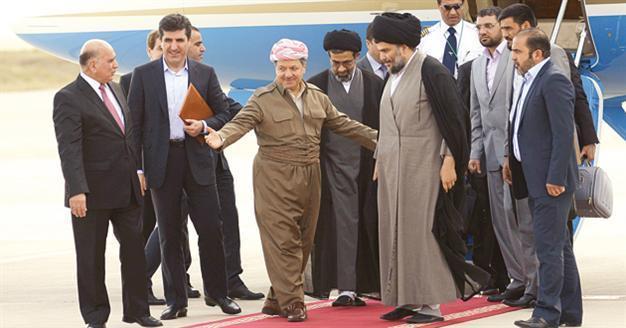Iraq prime minister rivals meet after lacking votes to oust him
ARBIL / BAGHDAD

KRG leader Masoud Barzani (C) welcomes Shiite cleric Muqtada al-Sadr upon his arrival in Arbil in this April photo. Leaders again meet in Arbil to solve the deadlock. AP photo
Rivals of Iraqi
Prime Minister Nouri al-Maliki, who accuse him of monopolizing power, met in Arbil yesterday while the prime minister called for national dialogue, a day after parties failed to collect votes to oust him.
The meeting chaired by Kurdistan Regional Government (KRG) leader Masoud Barzani included the chairman of Iraqiya bloc Ayad Allawi, representatives from the movement loyal to Shiite cleric Muqtada al-Sadr, and representatives from the main Kurdish faction, Anatolia news agency reported.
The meeting came after Iraqi President Jalal Talabani said al-Maliki rivals lack the votes to oust him. Opponents of the prime minister have accused him of monopolizing decision-making for months, with a political crisis that began in December worsening in recent weeks as open calls from multiple political parties withdrew confidence from al-Maliki’s national unity government.
But late June 9, Talabani said groups opposed to the prime minister lacked the 163 parliamentary votes required to sack him, with al-Maliki pushing yesterday for the country’s leaders to unite to rebuild the conflict-racked country.
“I take this opportunity to renew a call for all political partners to sit at the table for negotiations and to be open to discuss all disagreements,” the prime minister said in a statement issued by his office.
“I am sure we will be able to overcome all challenges and difficulties that are in our way,” he said, while also thanking Talabani for his “constructive” role.
Talabani’s office issued a statement June 9, saying there was insufficient backing to pass a vote of no confidence against al-Maliki. “Due to a lack of [support], the letter of his Excellency, the president of the republic, although its text was prepared, was not given to the parliament,” the statement said.
More than 160 lawmakers had originally supported the motion to unseat al-Maliki and by extension, his government, according to the statement. They included members of the secular Sunni-backed Iraqiya bloc, the main Kurdish faction, and the movement loyal to powerful Shiite cleric Moqtada al-Sadr. All three of those parties are members of al-Maliki’s national unity government.
At least 163 votes are required to pass a motion of no confidence in the prime minister, according to Article 61 of
Iraq’s constitution. A no confidence motion can be put before Parliament either by the president or by one-fifth of the 325 members of Parliament.
“Later, 11 of the signed lawmakers informed the office of the presidency of the withdrawal of their signatures, while two others requested to suspend their signatures,” Talabani’s statement said. It did not provide details on who the lawmakers in question were, or what blocs they belonged to. Despite Talabani’s statement, the crisis looked far from resolved, with Iraqiya, the Kurdish alliance, and Sadr’s bloc meeting in the Kurdish regional capital Arbil for further talks.
